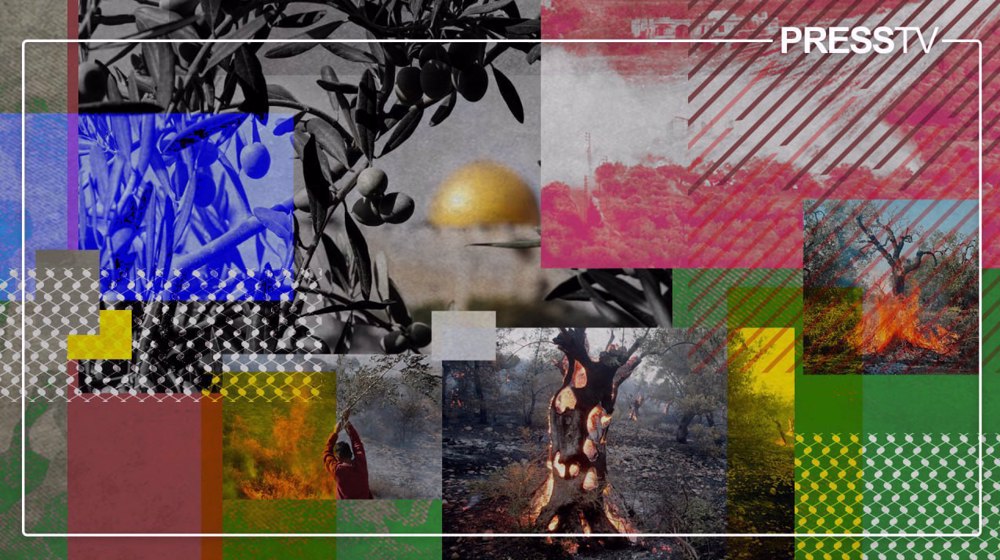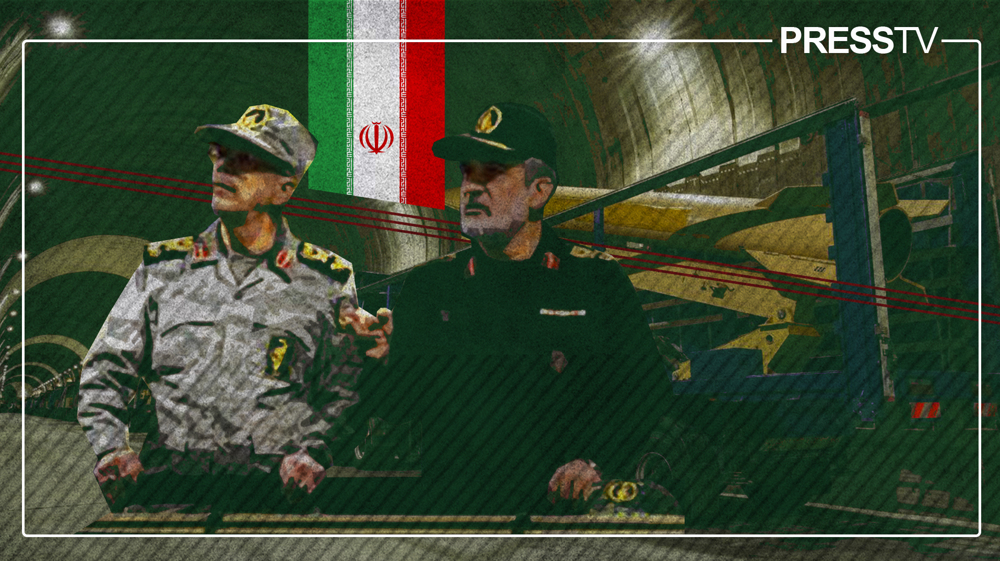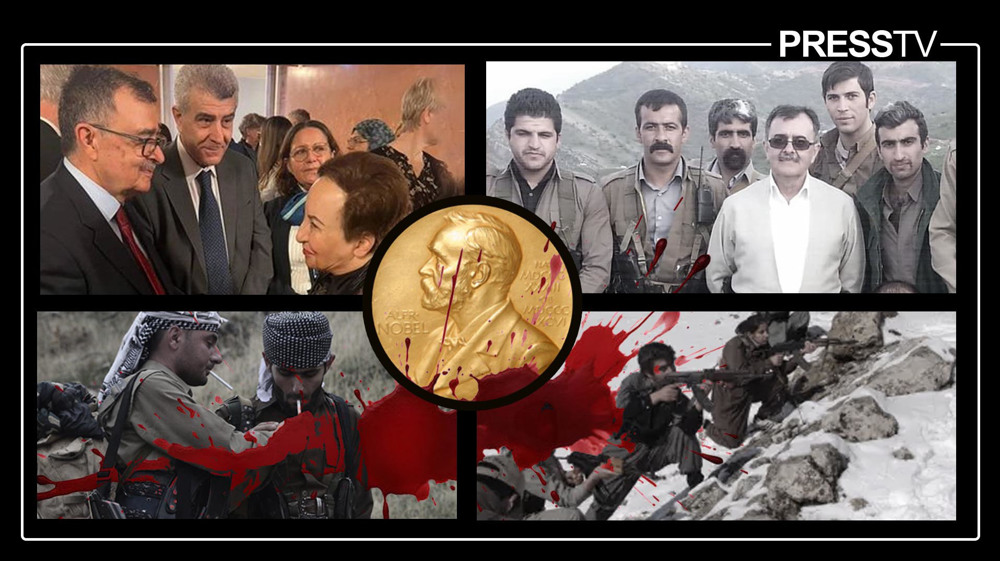In presence of terrorists, Nobel Peace Prize awarded to anti-Iran rabble-rouser
By Press TV Staff Writer
At the Nobel Peace Prize ceremony in the Norwegian capital Oslo on Sunday, controversy overshadowed the glitter of the evening due to both the recipient and the attendees.
The winner of this year’s prize, which has lost its prestige over the years, was a jailed anti-Iranian mercenary and rabble-rouser and attendees included members of a notorious terrorist group.
The prize, which includes a cheque of 11 million Swedish crowns (or $1 million), was taken by the children of Narges Mohammadi, who along with their father live and work in France.
Among those who attended the ceremony were Abdulla Mohtadi, the leader of the anti-Iran terrorist group Komala, who was photographed smiling with Shirin Ebadi, a noted anti-Iran figure.
All of them had something in common – they remotely cheered the slaughter of Iranian policemen and ordinary civilians during last year’s deadly West-backed riots in Iran.
Mohammadi, who became the face of riots due to her social media activities as well as the backing of Western agencies, was chosen by the Nobel Peace Prize committee for the award this year.
Mohtadi, the leader of the notorious Komala terrorist group based in the Iraqi Kurdistan region and militarily backed by the Western countries and the Israeli regime, was a guest of “honor.”
In October last year, Iran’s interior minister Ahmad Vahidi confirmed the role of Komala in riots, saying they were “planned, supported, and led by separatist terror groups,” including Komala.
Iraq’s Kurdistan region, which shares a border with Iran, has been a haven for terrorist groups such as Komala for very long, who often launch attacks on Iranian soil from there.
Iran’s military has launched aerial strikes at Komala positions on many occasions and repeatedly warned the authorities in Baghdad and Erbil to act against the groups backed by the US and Israel.
In August, Iran and Iraq reached an agreement to disarm and expel Kurdish terrorist groups, including Komala, from the semi-autonomous Kurdistan region in northern Iraq.
However, the leaders of Komala and other anti-Iran terrorist groups continue to be hosted and welcomed in Western capitals and invited to events such as the Nobel Peace Prize ceremony.
Kazem Gharibabadi, the Secretary of Iran’s High Council for Human Rights, in a post on X, formerly Twitter, slammed the event organizers for inviting a known terrorist leader.
He called out the fraudulence of the Nobel Peace Prize committee and its political agenda as the recipients include dreaded criminals such as Menachem Begin, Yitzhak Rabin, and Shimon Peres, ringleaders of Zionist terrorist groups who later became leaders of the Zionist entity.
"The presence of the Komala terrorist group’s ringleader Abdulla Mohtadi in the recent ceremony held to give the prize to Narges Mohammadi proved the nature of the organizers of the project and the award recipients more than ever," Iran’s top human rights official stated.
Why was Narges Mohammadi awarded?
This year's Nobel Peace Prize to Mohammadi, a little-known Iranian citizen who rose to fame in the West for her involvement in subversive activities in her home country acting under the directions of Western agencies, once again confirmed the political nature of this award.
This is the second Nobel Prize awarded to a person with Iranian citizenship, 21 years after Shirin Ebadi received it while executing the same Western project under different circumstances.
Mohammadi serves as vice president of the Defenders of Human Rights Center (DHRC), a Western-sponsored organization headed by Ebadi that serves the West’s agenda in the name of human rights.
She is currently serving a prison sentence in Tehran for undermining national security.
Mohammadi has been described by the Nobel Foundation and in the Western media as a "women's rights activist", although her activities are not related to women at all and do not have any practical political or judicial value.
Almost everyone she has defended, mostly writing on social media and giving statements to foreign media, were men who were jailed in Iran for murders and terrorist attacks.
Some of them include Abdolmalek Rigi, the leader of the Jundallah terrorist group, who was convicted of several bombings across the country that killed many Iranians, as well as Navid Afkari, who was convicted of the brutal murder of a security guard during last year’s riots.
She also passionately advocated the case of Ramin Hossein-Panahi, a member of the Komala terrorist group, who together with other terrorist outfit members, tried to carry out terrorist attacks on Quds Day rallies in Iran, but was arrested by security forces.
In reports and statements issued by Mohammadi and her organization, these terrorists, separatists, and murderers are frequently referred to by euphemisms such as dissidents, ethnic activists, or human rights activists.
Their criminal cases were whitewashed, with the typical clichéd claims of "judicial lapses" and "forced confessions," even though the convictions were based on undeniable material evidence.
Like Ebadi before her, Mohammadi received large sums of money from abroad to lobby the authorities, to pay prominent lawyers, local media, and victims' families, persuading them to give up seeking the reciprocal death penalty.
Such efforts to reduce the sentence or release serious criminals send a psychological message to new ones that they can commit the same crimes because they will have all kinds of support from these so-called human rights activists, i.e. foreign mercenaries.
Focus on separatist terrorism
According to this year's report by Iranian security services, cited last month by the Leader of the Islamic Revolution Ayatollah Seyyed Ali Khamenei, foreign powers tried to inflame last year’s deadly riots in Iran by dividing people along ethnic and religious lines.
This primarily refers to Kurdistan and Baluchistan, regions with predominantly Sunni ethnic minorities, where most deadly attacks on policemen and civilians were reported.
After examining Mohammadi's work during the riots, it is evident that her activities were focused on these two regions, advocating for the amnesty of arrested and convicted terrorists.
The same two regions were the focus of her London-based colleague Ebadi years ago, when she published a report on the "most promising areas" for directing their activities, even mentioning some Sunni clerics who could serve as their "allies" inside Iran.
Considering the fact that arming, training, and financing of separatist terrorists in these regions, according to available evidence, is directly connected to Western countries, the so-called "human rights activism” of the likes of Mohammadi reveals a sophisticated network of hybrid warfare.
For connections abroad, more specifically Western media and a network of similar Iran-focused "human rights" organizations, Mohammadi was assigned the role of spokeswoman for all court cases, with her task cut out – to defend the indefensible.
Although not well educated or professionally trained, Mohammadi was assigned the critical task of pushing the Western propaganda war against Iran and had the final say on Iran-related reports.
DHRC, where Mohammadi and Ebadi work, has for long played the role of a lobby group or pressure group as it engages with Western regimes in order to strengthen the sanctions regime against Iran, expel Iranian teams from sports competitions, and even sever diplomatic ties with Tehran.
The duo's subversive activities and foreign connections were known to Iranian security services, which is why Mohammadi landed in jail and had nothing significant in her defense, as per experts.
For the West, says a security source, the Nobel Peace Prize “was a way of saying thank you to Mohammadi for being a pawn in the dirty Western game against the Islamic Republic.”
Like Mohammadi, Ebadi also regularly stood up for separatist terrorists in Iran, falsely claiming to foreign media that the Iranian people want an end to the nuclear program and spreading various other disinformation in line with the nefarious political agenda of Western powers.
Her connections with foreign spy agencies have been widely documented, as well as remittances in her foreign bank accounts, the origin of which she has always refused to reveal.
Exposed and prevented from further planned work, Ebadi left Iran and settled in London, where she began aggressively calling out the Iranian judiciary for punishments that have been non-existent for decades and advocating sanctions and a full break in international relations with Iran.
Mohammadi's motives are not any different. In an interview last year, she called for stringent sanctions for Iranian officials, while seeking greater foreign aid for herself and her organization.
Her organization DHRC had collected data about students and politicians in Iran, categorized them according to political views, and sent the files abroad, which constitutes a violation of national security.
Some former members of her organization revealed that reports of individuals with undesirable political views were often fabricated, to have Western regimes impose sanctions on them.
Others compared their activities to the activities of the MKO terror cult during the revolution when they sold sensitive information to foreign spy services and sought the elimination of key politicians.

Explainer: Trump doubles down on bid to grab Greenland – what’s really behind it?

Palestine Land Day: A powerful emblem of resistance against settler-colonialism

Explainer: What does Iran's largest subterranean 'missile city' reveal?
Hind Rajab Foundation to file legal action ahead of Netanyahu’s planned trip to Hungary
VIDEO | Iran marks Islamic Republic anniversary
Russia warns of ‘catastrophic’ consequences if US attacks Iran
No such thing as ‘military option’ let alone ‘military solution’ to nuclear issue: Iran
Iran VP opens privately-owned $150 mln hotel in north Iran
Iran urges IAEA to take a clear stance against threats to its nuclear facilities
Palestinian teenager dies in Israel's jail after being held 6 months without charge
Pro-Palestinian student leaves US amid deportation threats







 This makes it easy to access the Press TV website
This makes it easy to access the Press TV website